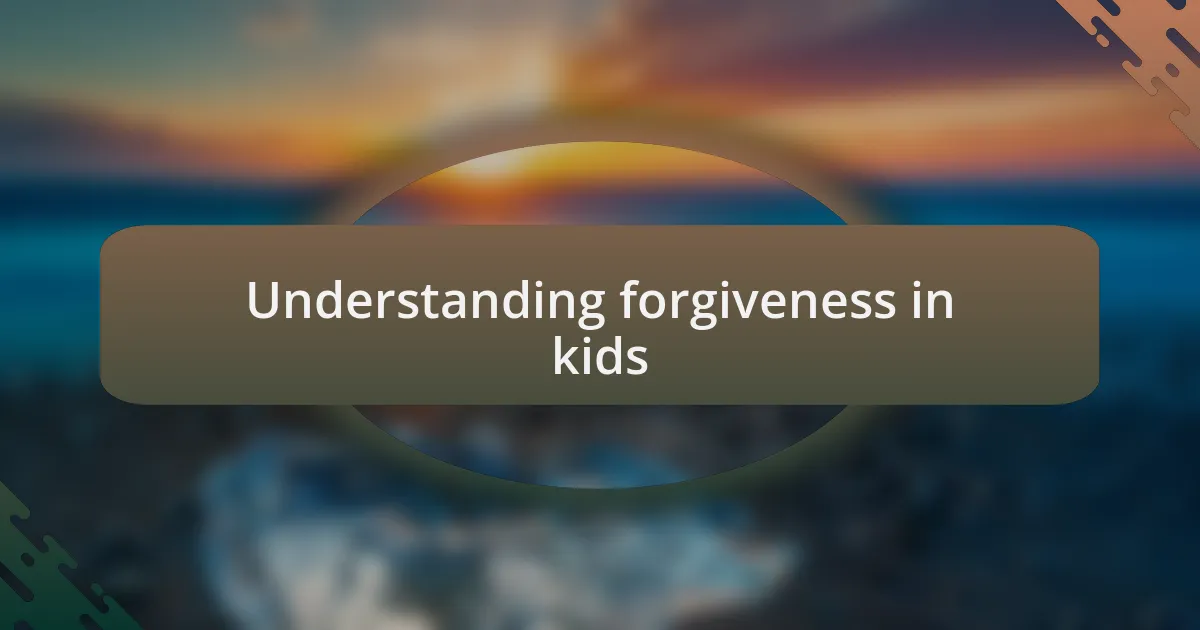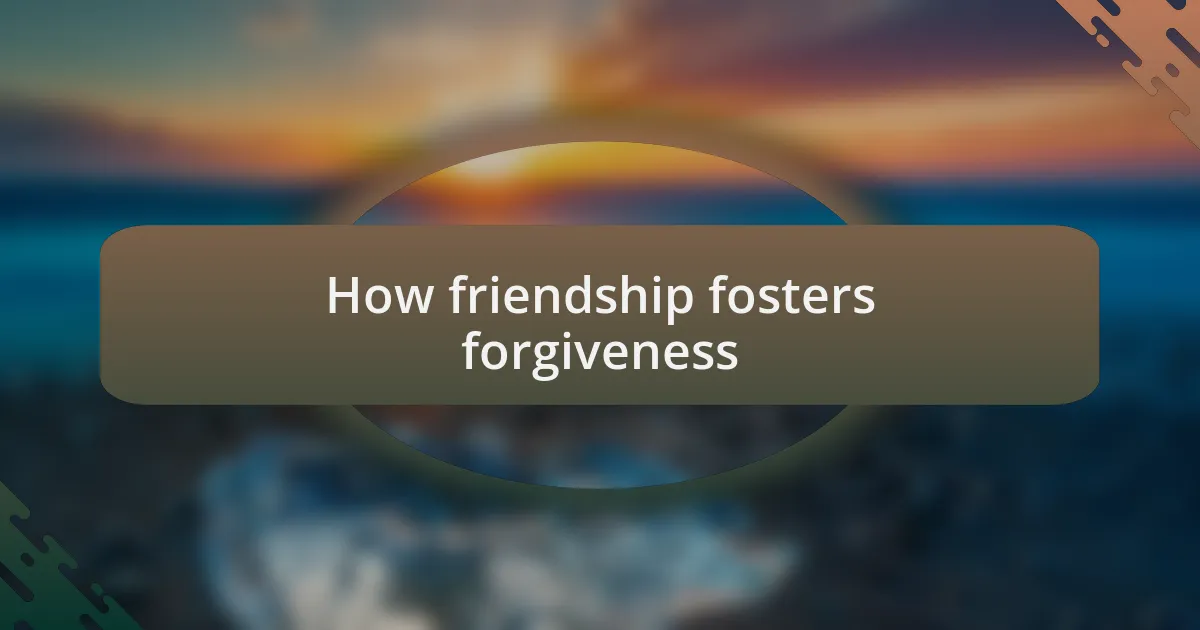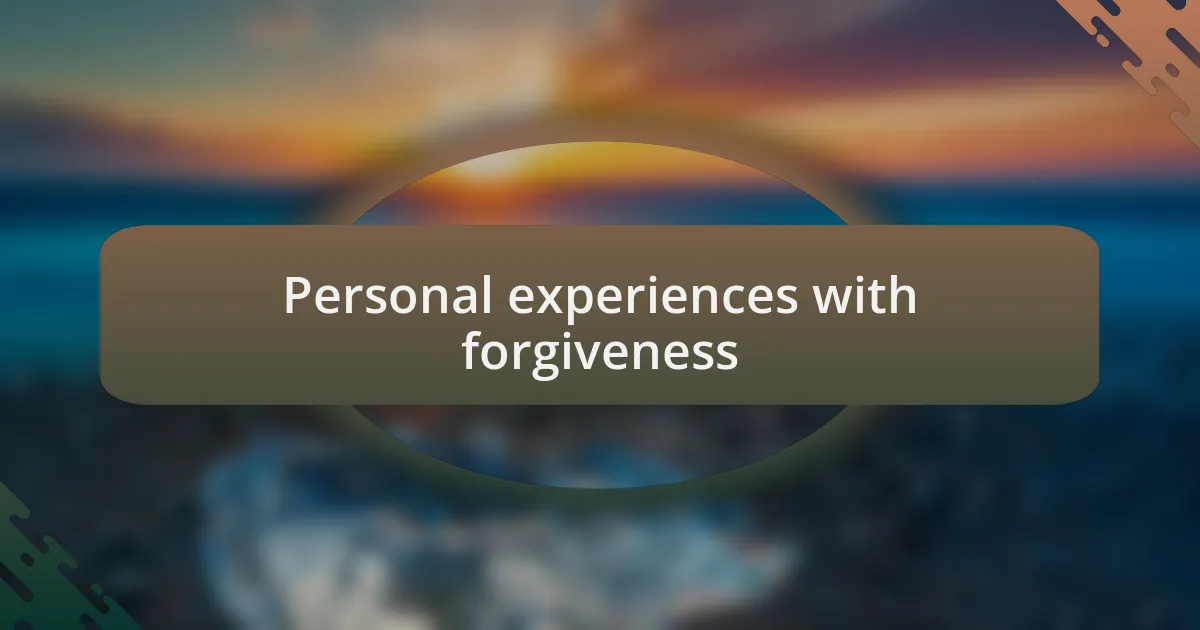Key takeaways:
- Children often understand forgiveness through empathy and the desire to maintain friendships rather than merely through verbal apologies.
- Storytelling helps children process emotions and fosters empathy, allowing them to discuss complex topics in a safe environment.
- Friendships encourage open communication and resolution of conflicts, teaching children resilience and the importance of letting go of minor grievances.
- Personal experiences, such as mistakes and misunderstandings, highlight the importance of vulnerability and honesty in the forgiveness process.

Understanding forgiveness in kids
Forgiveness is a complex concept, especially for kids who are still navigating their emotions. I remember a time when my son accidentally broke his friend’s toy during playtime. Instead of getting angry, his friend surprised me by simply saying, “It’s okay! We can fix it together.” This moment revealed how children often possess a natural instinct for empathy, highlighting that forgiveness can come from understanding rather than just the act of saying “I’m sorry.”
It’s fascinating to see how kids interpret forgiveness differently than adults do. I once overheard a group of my daughter’s friends discussing a disagreement they had, and instead of focusing on blame, they talked about how they missed playing together. This conversation made me realize that children often forgive because they genuinely value their friendships and want to reconnect. Don’t you think that desire to mend relationships is something we should cherish and encourage?
As I’ve observed, the journey to forgiveness for children often involves a blend of honesty and vulnerability. My niece once held a grudge against her best friend for not inviting her to a birthday party. During a heart-to-heart, she confessed her feelings and learned that her friend had simply forgotten to ask. It reminded me how necessary it is for kids to communicate openly, allowing them to recognize misunderstandings, which can pave the way to forgiveness. How can we create spaces for such honest conversations in our children’s lives?

Importance of storytelling for kids
Storytelling serves as a vital tool for children, helping them process their emotions and experiences. I recall a particular night when my daughter and I cuddled up with a book about a young hero who learned to forgive. She was so engrossed in the character’s journey that she began to draw parallels to her own friendships. It struck me then how stories offer children a safe space to explore complex emotions like forgiveness without the pressures of real-life situations.
In my experience, storytelling cultivates empathy among kids, allowing them to step into someone else’s shoes. I often tell my son stories about diverse characters facing different challenges, and it’s rewarding to see how he develops a sense of compassion. Have you noticed how children often ask empathetic questions after listening to a tale? These moments become opportunities for them to reflect on their relationships and consider the feelings of others.
Moreover, storytelling can bridge the gap between difficult topics and children’s understanding. I remember sharing a story about a pair of friends who disagreed but eventually reconciled through heartfelt conversations. It opened up a dialogue between us about disagreements in his own friendships, making it easier for him to articulate his feelings of hurt or confusion. Isn’t it fascinating how a simple narrative can transform a tough subject into a meaningful discussion?

How friendship fosters forgiveness
When I think about my child’s friendships, I realize how crucial these bonds are for cultivating forgiveness. One afternoon, my daughter and her friend had a falling out over a misunderstanding. Rather than letting it fester, they worked through their emotions while drawing together. This simple act highlighted the power of friendship in encouraging open communication and ultimately led to an apology that healed their rift.
In my observations, children are often more willing to forgive when they feel valued in their friendships. I once witnessed my son getting upset over a minor issue, but after discussing it with his friend, they both realized how much they enjoyed being together. Their laughter quickly turned the tide, showing how friendship can dissolve grudges and bring back joy. Isn’t it incredible how laughter can lighten heavy hearts?
Honestly, each time my children navigate these moments, I find myself reflecting on the deeper lessons of forgiveness. I’ve noticed that friendships serve as a practice ground for learning to let go of minor grievances. These experiences shape how they handle conflicts in the future. When they forgive one another, they’re not just mending a relationship; they’re building resilience for life’s bigger challenges.

Personal experiences with forgiveness
I remember a time when my daughter came home, upset after a disagreement with her best friend. As she sat on the edge of her bed, tears streaming down her face, I gently encouraged her to think about what her friend might be feeling. It struck me how empathy comes into play in forgiveness; it’s not just about saying sorry, but understanding the other person’s perspective that truly mends the hurt.
Another experience that stands out for me is the day my son accidentally broke a cherished toy while playing at a friend’s house. He was filled with guilt, fearing he might lose that friendship. But after a heartfelt conversation, the friend reassured him that mistakes happen. Watching their bond grow stronger from that moment made me realize forgiveness often begins with vulnerability and honesty. Isn’t it fascinating how our errors can help us connect on a deeper level?
Reflecting on these moments, I see how forgiveness reshapes our children’s relationships. I’ve noticed that every time they forgive, they seem to grow a little closer, almost like they’re weaving threads into a tapestry of trust. Isn’t that the essence of friendship? Navigating forgiveness together not only resolves conflicts but equips them with the tools they’ll need in the larger world.